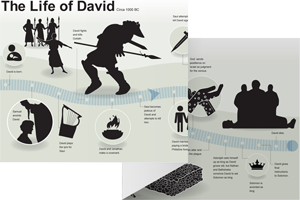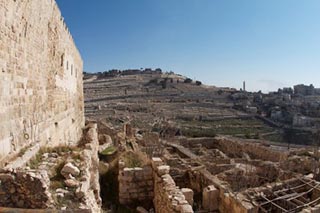17:1–58 In this chapter, David proves his valor and demonstrates that he is fit to be Israel’s next king. The Philistine giant, Goliath, taunted the armies of Israel daily. When David came to deliver food to his brothers, he heard the haughty giant and was grievously offended. He charged Goliath with only a shepherd’s implements and struck him down. As a demonstration against the Philistines, David decapitated the giant and took his armor. This was Israel’s first victory at the hands of David. |
17:1 gathered their camps for battle It is uncertain how much time elapsed between ch. 16 and 17.
17:2 the valley of Elah This valley was in the Shephelah, the western foothills of Israel. It ran between Philistine territory in the west and Judah in the east. The Philistines were on the north side of the valley, and the Israelites on the south.
17:4 a champion Commanders of opposing armies in the ancient Near East would occasionally avoid engaging all their forces; instead, each would select his best fighter to engage in a death match with the best fighter from the other army. The winner determined the outcome of the battle (see v. 9). Goliath was this type of fighter.
six cubits and a span The Hebrew Bible, the Septuagint (the ancient Greek translation of the ot), and the Dead Sea Scrolls vary with regard to Goliath’s height. The Hebrew Bible states that he was six cubits and a span—roughly nine and a half feet tall (or perhaps a few inches more). This would make him about half a foot taller than the world’s tallest man in medical history (8 feet, 11 inches). The latter two sources, however, describe him as four cubits and a span—roughly six and a half feet tall. It is possible that the number “six” in the Hebrew text (“six cubits and a span”) could have been inadvertently introduced when the scribe’s eye saw “six” a few lines below in v. 7.
17:5 A bronze helmet This article, and the others, contrast the simply clothed Israelites.
17:9 If he is able Goliath’s explanation of representative warfare may indicate that Israel is ignorant of or inexperienced with the custom. See note on v. 4.
17:10 I hereby defy the battle lines of Israel today Goliath’s boast is the reason for David’s anger in v. 26.
17:11 very afraid The most common adjective used of Saul (see 10:22 and note).
17:13 The three oldest sons of Jesse Eliab, Abinidab, and Shammah (see also 16:6, 8, 9).
17:17 bring them quickly to the camp Due to the lengthy standoff in 1 Sam 17:16, the army was running low on rations. Families of the troops help provide for the army.
17:18 take their pledge Proof that they were alive and well.
17:25 the man who defeats him, the king will make him very rich with This man would receive three benefits: riches, Saul’s daughter in marriage, and his extended family would be free from taxation.
17:26 the battle lines of the living God David perceives that Goliath is not just insulting Israel, but Israel’s God.
17:28 Eliab became very angry Eliab may have been bitter at being passed over for the kingship, or perhaps David’s courage clashed with his fear.
17:31 words which David had spoken were heard Regardless of David’s intentions, the word of his discussions with the members of the army eventually got back to the king, who in turn summoned him.
17:36 this uncircumcised Philistine A pejorative phrase that is made worse by the equation of him with the beasts of the field.
17:37 may Yahweh be with you Ironically, it is a shepherd boy, and not the king, who represents Israel on the battlefield and shows faith in Yahweh. Saul’s resignation to allow David to fight is another indictment of his fear.
17:38 body armor In terms of battlefield strategy, Saul assumes that heavy infantry should be met with heavy infantry.
17:39 David removed them He stripped down to his standard attire, likely just a tunic and belt. He decides to meet heavy infantry with light artillery (his sling and stones), which is substantially more mobile and can give one the advantage in certain battlefield contexts.
17:40 the wadi Or wadi.
17:42 he despised him The text recounts that Goliath’s disdain is rooted in David’s youth and appearance. Goliath is also offended by David’s approach to battle (v. 43). The narrative deliberately contrasts Goliath’s stature with David’s, further highlighting David’s spiritual qualification and divine anointing (with the Spirit) as Israel’s next king.
17:45 Then David said These verses begin David’s battlefield declaration, which communicates the theological payoff for the episode. The victory will serve as a proclamation of the Lord’s salvation for His people.
17:46 all the earth may know This match was so improbable that the people could only see David’s victory as divinely enabled.
17:47 assembly will know David’s victory would also reassure the Israelites that God was fighting for them.
does not rescue with sword or with spear Weapons did not determine the final outcome of the battle. This was encouraging to the Israelites, who had fewer weapons than the Philistines (see 13:19–22; note on 13:19).
17:48 David ran quickly In contrast to Saul and his fleeing army (see v. 24), David runs toward the Philistine giant.
17:49 slung David’s use of a sling and a stone allow him to fight from a distance, something Goliath’s arsenal did not permit (see note on v. 39).
into his forehead David hits Goliath beneath the front of his helmet (see v. 5), demonstrating his accuracy.
17:51 cut off his head Earlier, God decapitated the Philistine’s god on whom they relied in battle (see 5:4). Now, David decapitates their champion.
17:52 as far as the valley and up to the gates of Ekron Roughly 10 miles away.
17:54 to Jerusalem Jerusalem did not yet belong to Israel; it was in Jebusite hands (see 2 Sam 5:6–7).
his weapons A prize (compare 1 Sam 5:2). David would later dedicate these items to God, as was called for by Yahweh in this type of warfare (see 21:9; note on Josh 6:17).
17:55 Whose son is this young man, Abner? It is unclear why Saul asks this question, since 1 Sam 16 indicates they knew each other (compare v. 15). This story may have occurred sometime before 16:21. Alternatively, it may be that David’s bravery on this occasion causes Saul to take a more active interest in him than he had before.

|
About Faithlife Study BibleFaithlife Study Bible (FSB) is your guide to the ancient world of the Old and New Testaments, with study notes and articles that draw from a wide range of academic research. FSB helps you learn how to think about interpretation methods and issues so that you can gain a deeper understanding of the text. |
| Copyright |
Copyright 2012 Logos Bible Software. |
| Support Info | fsb |
 Loading…
Loading…



